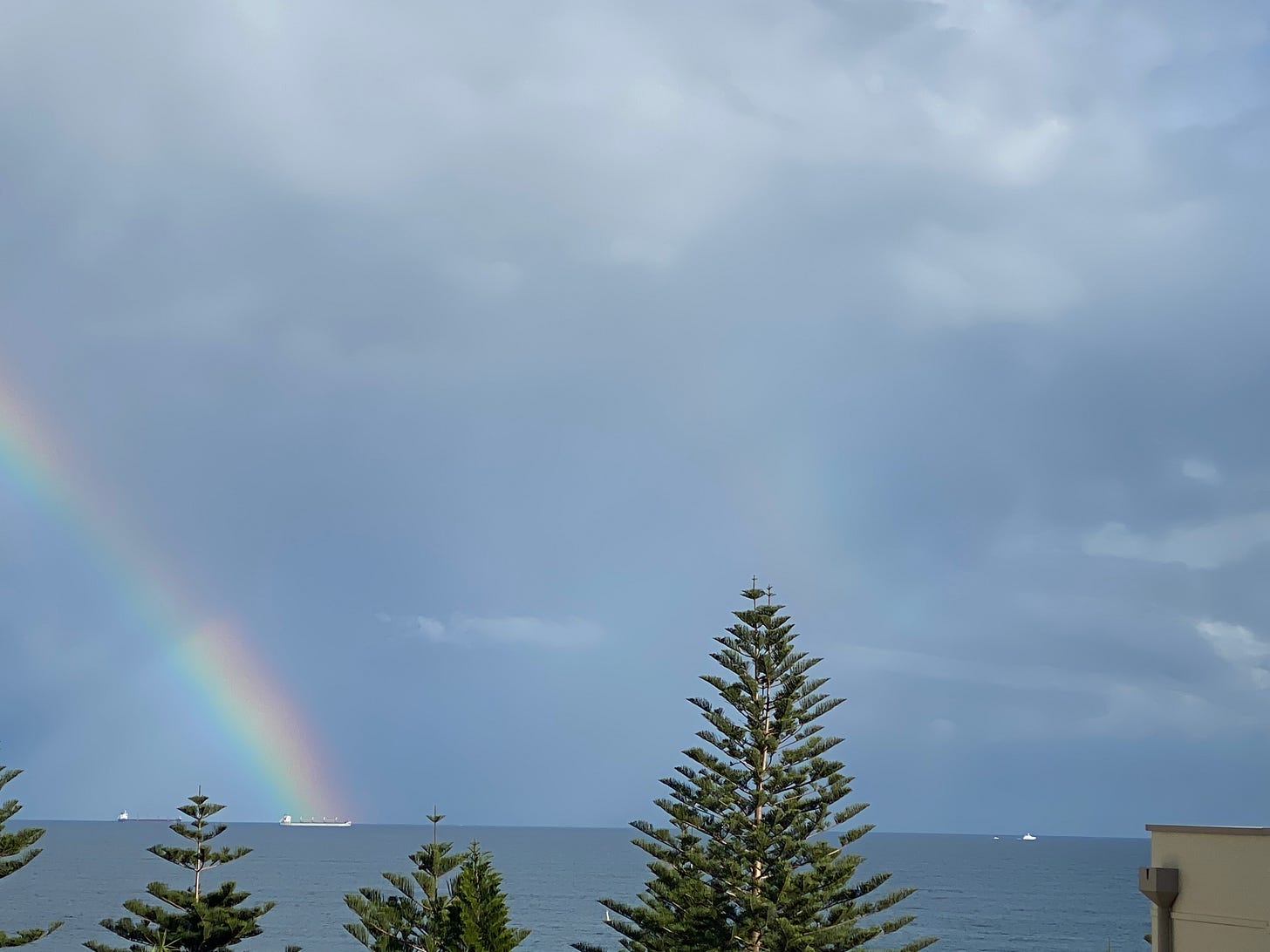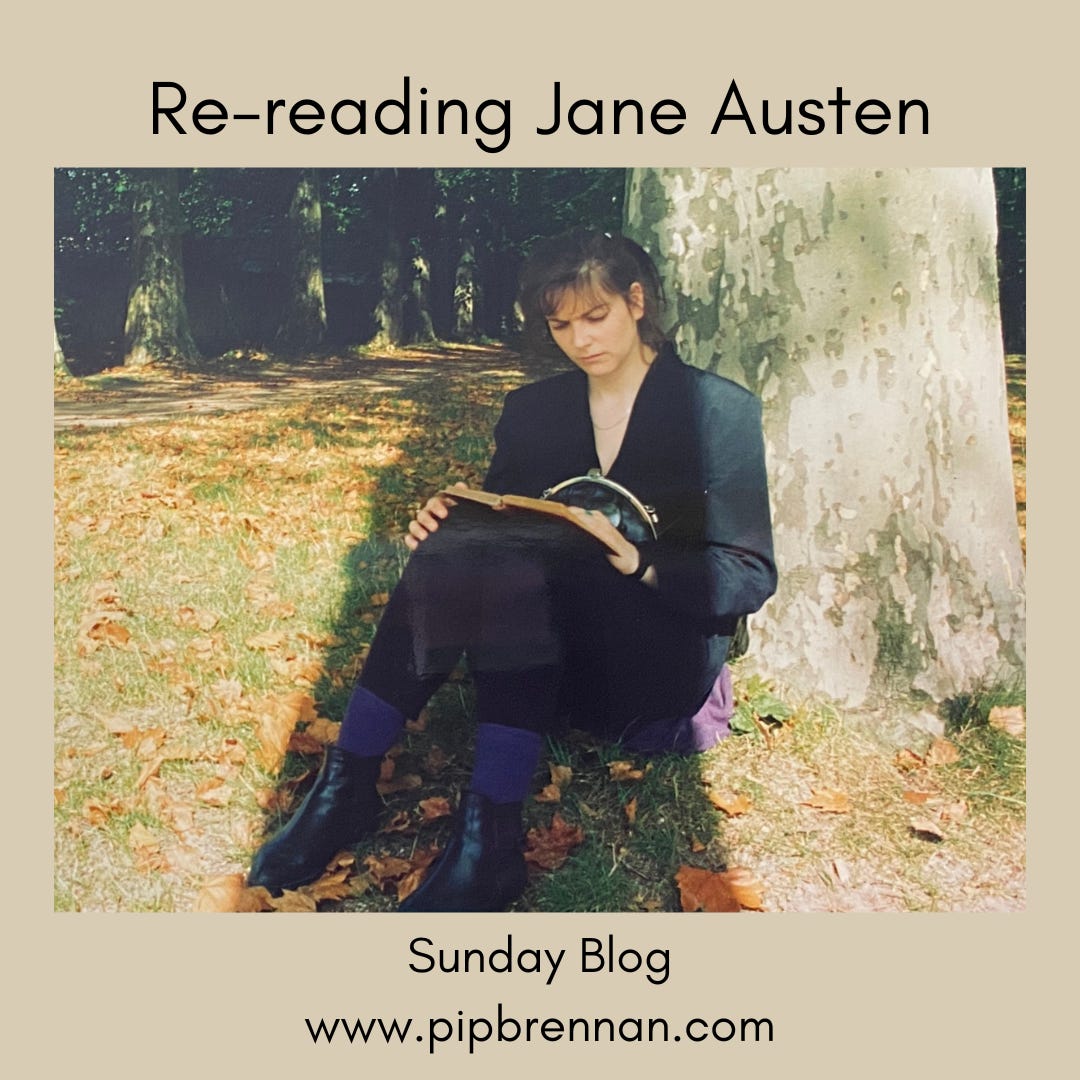Re-reading Jane Austen
Sunday Blog 140 - 16th June 2024
This weekend I stayed in a hotel in my home town, in Scarborough. Sometimes I just need that little bit of variety. It wasn’t quite KSP Writers’ Centre but it was just the refreshing pit-stop I needed to dive right back into writing projects.
I walked along Scarborough Beach in the gorgeous winter sunshine, and marvelled at how much I thought about the Blind Boy podcast as I walked along. (He’s an acquired taste, you’re welcome.) I’d listened to quite a few of his long episodes as I walked up and down the Scarborough coastal path on other weekend getaways. The sounds of his podcast were encoded into my body’s memory as I walked along, breathing in the deep lung fulls of sea air. I thought about how much he would love this winter’s day, and think it as good as a perfect Irish summer’s day.
The beautiful weather held right up until I left. The rainbow heralded the heavy showers that have visited most of this afternoon. See picture below.
Exciting news - Quairading Writing Workshop 21-22 July
Facilitated by moi and hosted by the beautiful Quairading shop The Maker’s Keep, this is an opportunity for West Australian women to start or continue a writing project, in a safe and supportive space. You can work on that poem, life story, a short story, an essay, journalling…your call.
There will also be a Labyrinth walk on Saturday night to dig into your creative questions.
The cost for the weekend is $600 including all meals, transfers, food, tea, coffee, experiences and accommodation once in Quairading. If this interests you, please contact Janine at The Maker’s Keep 6383 on 0400 085 235 or via email janineterri@outlook.com.au to secure your spot.
SPOTS ARE STRICTLY LIMITED
I had the joy of visiting Quairading in 2022 as a guest of The Maker’s Keep and wrote my Sunday Blog about it - entitled Love Note to Quairading. I hoped I would get back sooner, so am very excited to be heading there in July. There will be early wildflowers…
Sunday Blog 140 - 16th June 2024
And now, onto the Sunday Blog! This week’s Sunday Blog started to push through earlier in the week, and I’ve been working down the layers of it ever since. Here goes.
I’m guessing the very first time I read Pride and Prejudice (P&P) I was 16, when the excellent 1981 TV series first aired. I remember the copy we had in our family library. Our shelves were stuffed with classic fiction, poetry, and history. How I loved the small, navy-blue hardback copy of P&P, with its imprint of “Oxford’s World Classics” debossed on the front cover. The rice-paper thin pages and antiquated versions of some words, like shewn instead of shown, for example. How people would dress a sallad and cucumber. I raced through every book Jane Austen ever wrote, and the ones she didn’t quite get to finish.
P&P’s particular perfection soothed me, and over time I considered that navy hardback edition mine and I took it with me when I moved to Europe, aged 25. Perhaps I kept re-reading it to see how I’d changed, while the book’s perfection remained the same.
In the picture I’m 27 years old, re-reading it in the shade of a tree in the garden of Versailles. I was living in London, so that was one decade’s worth of re-reading already. But there was more to come. After a four-week teacher training course, I moved from London to Greece in 1996 to take up a position in a school. I took P&P with me, the only book I saved from my library. I knew I’d need all the comfort perfect prose could provide.
Teaching was every bit as hard as I thought it would be, and the isolation of having to schlep to the phone box to talk to anyone super-charged my isolation. One particularly trying day, I took my sacred copy of P&P with me to the phone box. (Why? Why?) Somehow, in the fug of homesickness and the miasma of unfinished conversations, I left the book at the phone box. Just three blocks later I realised, rushed back breathless - it was gone. I trudged home to my apartment. Sometimes the universe can’t resist giving you a thorough drubbing.
But leaving a well-loved 1950s edition of P&P in a phone box in Thessaloniki in 1997 really was small beer. The giant body blow of surviving a home invasion in 2002 got me thinking about Jane Austen again. I was tussling with how difficult it was to stay in the house afterwards. I wanted to stay but my body was in post-traumatic revolt. In my memoir about the incident (which I’m currently revising), I wrote:
“I thought of Jane Austen’s Anne in Persuasion, who comments ‘one does not love a place less for having suffered there.’ I realised now that only applied to emotional suffering. The kind of visceral, physical ordeal I underwent was precisely what Georgian and Victorian women of the upper classes were assiduously protected from. Perhaps this experience would finally cure me of my habit of re-reading Jane Austen novels. Perhaps that wasn’t altogether a bad thing.”
Apart from being awoken out of my Regency Classics world by reality, another reason I’ve stopped re-reading Jane Austen is that there are just too many new books to read.
Like Zadie Smith’s The Fraud. If you haven’t read it, I would recommend. It’s a complex novel which depicts the enormous suffering of the Caribbean plantation slaves through its complex and even funny plot.
As I listened to a wide-ranging interview with Zadie Smith about the book, discussing her writing and teaching life, my hair nearly stood up on end as she said,
“So if I were teaching, for example, Pride and Prejudice, nothing could be more natural or normal to me to hold multiple ideas simultaneously. I adore that book. I can teach it at a level of rhetoric, a level of character, as a history of the middle classes in England. I know exactly where Darcy's money comes from: It comes from the Caribbean.”
Interview with Zadie Smith on NPR - https://www.npr.org/2023/09/05/1197604421/zadie-smith-the-fraud
I’m not ruling out ever re-reading P&P again. I now have a green hardback copy on my own shelves, just in case. It jostles with hundreds of more recent books and looks out of place in its antiquity.
When and if I do read P&P, I will always understand the social and economic context of the delightful grounds of Mr Darcy’s home, Pemberley. And that’s not altogether a bad thing. In fact, it’s a vitally important thing.




